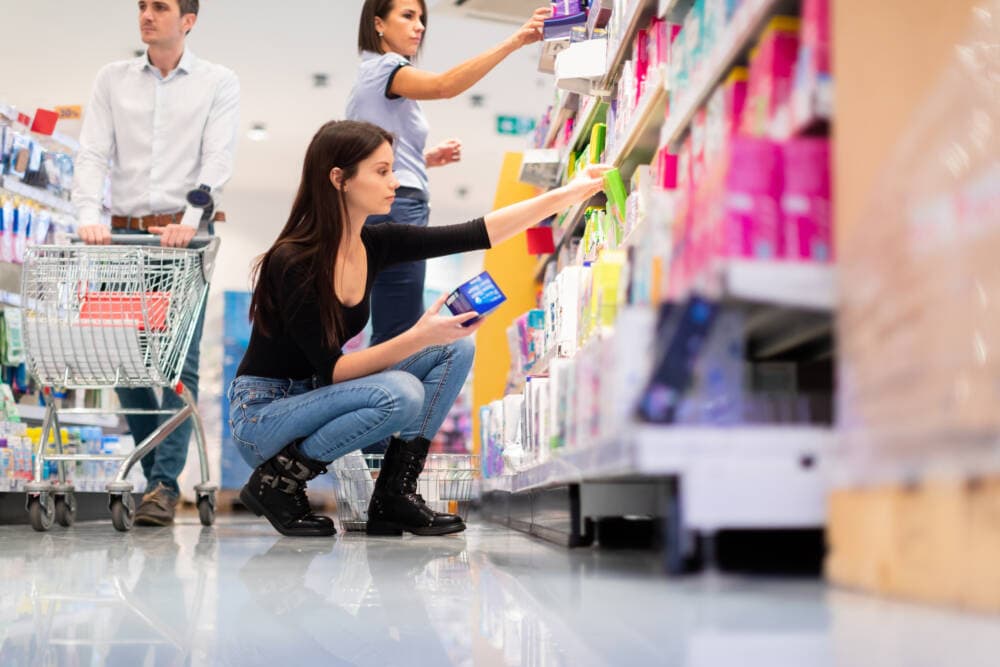Advertisement
Commentary
My kids aren’t embarrassed to talk about periods. Why am I?

“On our way, can we stop at CVS? I need pads.”
Thus read a message from my then 14-year-old daughter on a group text with me, my husband and my in-laws, who were about to pick the kids up for an overnight at their place.
I felt a full-body cringe. My daughter had just told not only her grandmother, but her 80-year-old grandfather, that she was having her period. This was followed by a pang of embarrassment: how had I failed to impress upon my daughter that periods weren’t a topic for discussion with the grandparents?
When I was growing up in the '80s, I never uttered a word about my period in front of my family, with the exception of telling my mother when I needed more pads or tampons. That is, I assume I told her this — certainly in private, and probably sotto voce — although I have no memory of it. Maybe she just periodically (ha) delivered feminine hygiene supplies to the bathroom like some sort of magical menstrual fairy. Or maybe I bought the stuff on my own, with my crumpled wads of babysitting cash, probably throwing a superfluous Coke or turquoise mascara onto the checkout counter in a vain attempt to disguise what I was actually there for.

My mother presumably told my father when I first got my period, but I would have died if he’d ever referenced it — not that he would have in a million years — or caught sight of a pair of stained underwear on its way into the wash. As for my grandparents? Dear God, had I uttered a word about my period in their presence, I think there might have been an actual, audible record scratch.
After the text thread incident, I gently suggested to my daughter that maybe she should keep her menstrual status private where men were concerned — especially older ones.
But even as I said the words, I was disappointed with myself. I’ve always talked frankly with my daughter and her sibling about anatomy, puberty and sex. I want them to be unselfconscious about their periods. On an intellectual level, I think it’s great that they don’t hesitate to complain about cramps in front of (or to) their father, yell from the bathroom that they need a pad or, yes, ask their grandparents to take them on a supply run. Why should they have to tiptoe around anyone else’s discomfort when it comes to a normal bodily function?
I love that most of their peers have the same nonchalant attitude. I’m in total support of the cultural shift around menstruation that has begun in recent years — the way younger people, particularly women and girls, are vehemently and vocally rejecting the idea that periods should be taboo, and pushing back on long-held beliefs that women are dirty or impure while they’re menstruating. Activists, many of them teens themselves, have taken up the cause of making menstrual supplies more widely available and affordable so that no one has to miss work or school because they’re having their period. Makers of period products — the name itself more matter of fact than the euphemistic “feminine hygiene” — are on board too, talking about the realities of menstruation with frankness and humor in their ads.
I think it’s fantastic. All of it. So why am I -- liberal, feminist me -- telling my teen daughter ixnay on the aring-shay?
Even Hollywood is starting to push the envelope: Pixar’s animated feature “Turning Red” includes open discussion of periods and puberty (something that many conservative parents and critics were not happy about). Right now, a film adaptation of Judy Blume’s “Are You There, God? It’s Me Margaret” is in theaters — something that would have been unthinkable a generation ago, despite the fact that the book was basically the puberty bible for me and my fellow Gen X women.
I think it’s fantastic. All of it. So why am I — liberal, feminist me — telling my teen daughter ixnay on the aring-shay? Why do I still use hushed tones when talking about periods in public or asking a friend if they have an extra tampon? (Even writing that last phrase made my pulse quicken.) For that matter, why do I assume my father-in-law was embarrassed by my daughter’s request? For all I know, he took it in stride, just like his son, my very feminist husband, who shrugged it off as no big deal. He’s embracing the period revolution more successfully than me in some ways.
I wish it were easier for me to shake my ingrained prudishness. I have friends, also mothers of teens, who struggle with this as well. It’s hard to unlearn the messages we’ve been given about our bodies our whole lives: that our ability to bear children is glorious and miraculous, and very much appropriate for public celebration, but the whole menstruation thing that makes it possible is kind of icky, so please keep it hush-hush.
But I’m trying. And, being a writer, one of the ways I’m doing it is through my work. In my new novel, “The Society of Shame,” the 40-something wife of an up-and-coming politician is launched to very-much-unwanted internet fame when a photo of her “feminine hygiene malfunction,” i.e. a blood stain on the back of her pants, goes viral. She is utterly humiliated — not a huge stretch for me to imagine. But the fact that the photo is perceived as scandalous ends up sparking a mass movement to destigmatize menstruation: #YesWeBleed. Like me, the heroine supports the cause on an intellectual level, but struggles to lose her own sense of shame and squeamishness around periods. It’s her adolescent daughter, and legions of other people in their teens and twenties, who embrace the movement most wholeheartedly.
Very meta, I know.
Writing the book and sharing it with the world has actually been a form of exposure therapy for me. Talk enough about menstruation, whether in joking or in earnest, and the shame factor starts to fall away.
Maybe, eventually, I’ll be as unabashed about menstruation as my kids and their peers are. In the meantime, I’m cheering them on for their refusal to be ashamed of this amazing thing that their bodies can do. Even if it’s sort of gross. (See? I’m not there yet…) And if I somehow helped foster this attitude in them — that is, if I mostly, successfully concealed my deep-rooted discomfort — well, cheers to me too.

